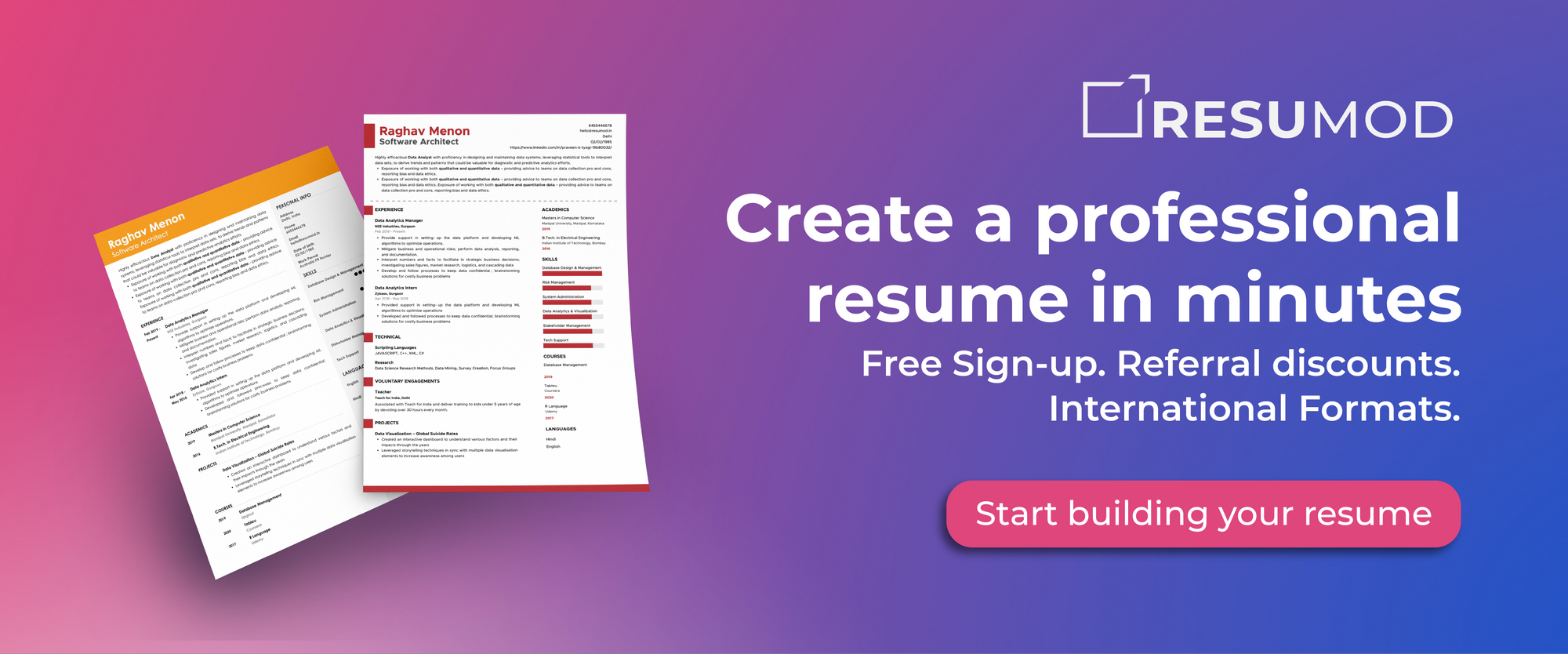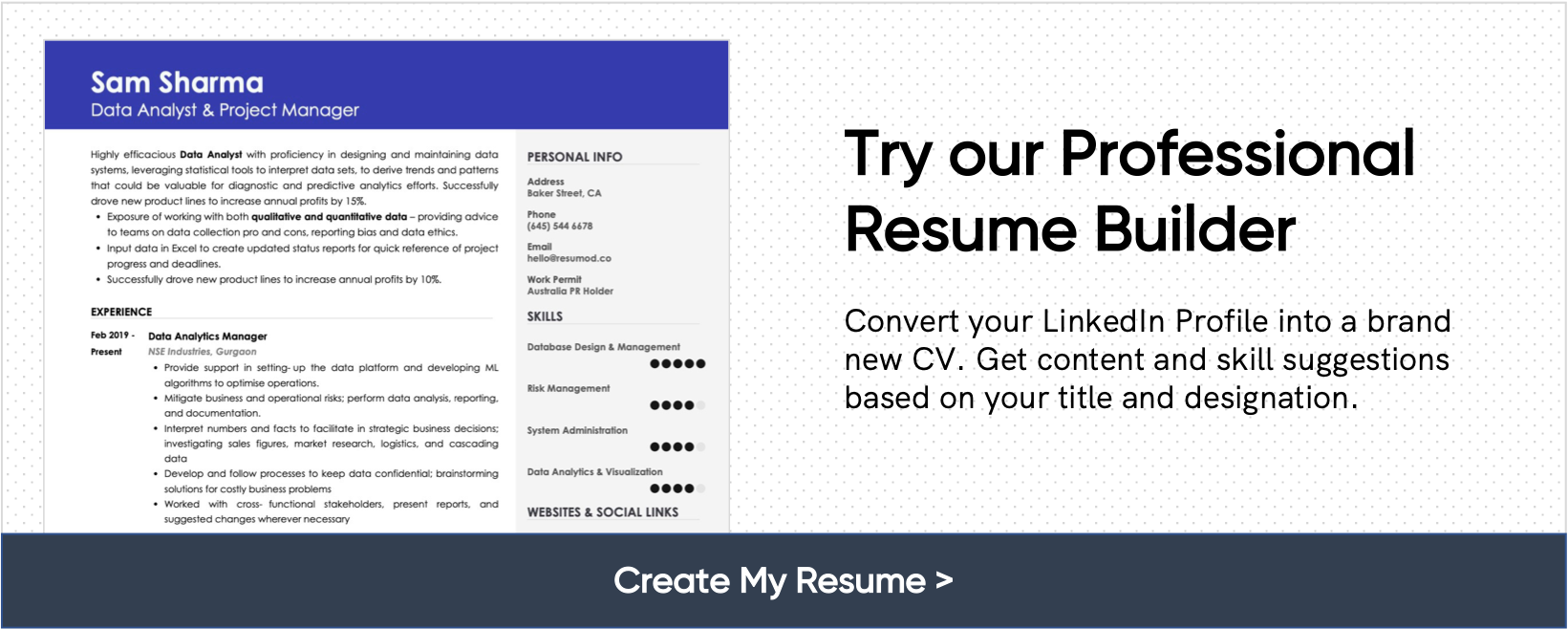How to Become a Data Scientist in 2024 + Resume Examples
If you're intrigued by the prospect of turning data into actionable insights, read on for a comprehensive guide on becoming a data scientist.
In an era where data is king, the demand for data scientists has skyrocketed. According to the U.S. Bureau of Labor Statistics, the field of data science is projected to grow by 15% from 2019 to 2029, much faster than the average for all occupations. This growth is powered by the increasing data generation and the need for deeper insights across industries. If you're intrigued by the prospect of turning data into actionable insights, read on for a comprehensive guide on becoming a data scientist.
- Understanding the role of a data scientist
- How to become a data scientist
- How to create a data scientist resume
- Top data science resumes on Resumod
Understanding the Role of a Data Scientist
Data scientists are at the forefront of unlocking the potential of data, employing both technical prowess and domain knowledge to forecast trends, inform strategy, and drive innovation. Their work spans various tasks, from data cleaning and analysis to machine learning and predictive modelling, all aimed at solving complex challenges.

Source: siksha.com
How To become a Data Scientist
Educational Background
A solid foundation in mathematics, statistics, and computer science is key for aspiring data scientists. Degrees in relevant fields lay the groundwork, while specialized training, available through both traditional and online platforms, hones the necessary skills.
Essential Skills for Data Scientists
Blend technical proficiency with soft skills to thrive in data science. Below are tables detailing these essential skills:
Technical Skills
| Skill Category | Skills & Technologies |
|---|---|
| Programming Languages | Python, R, SQL |
| Data Analysis & Visualization | Pandas, NumPy, Matplotlib, Seaborn |
| Machine Learning & Deep Learning | scikit-learn, TensorFlow, PyTorch |
| Big Data Technologies | Hadoop, Spark |
| Database Management | MySQL, PostgreSQL, MongoDB |
Soft Skills
| Skill | Description |
|---|---|
| Problem-solving | Ability to dissect complex issues and find solutions |
| Communication | Skill in articulating findings to non-technical stakeholders |
| Business Acumen | Understanding the economic implications of data-driven decisions |
| Collaboration | Working effectively within team environments |
You can learn these skills through a Bachelors and/or Master's degree in data science or go for additional courses to hone your skills.
Building a Portfolio
The next step after skilling yourself is showcasing your skills. An important aspect of learning in data science and other technical fields is projects. Partipate in plenty of projects and then use them to build a compelling portfolio.
A diverse portfolio can significantly bolster your job prospects.
Below are examples of projects that showcase a range of skills:
- Sales Forecasting for Retail: Using machine learning models to predict future sales based on historical data.
- Customer Sentiment Analysis: Employing natural language processing (NLP) techniques to gauge customer sentiment from reviews or social media.
- Fraud Detection System: Creating models to identify potentially fraudulent transactions in banking or e-commerce.
- Healthcare Data Analysis: Analyzing patient data to predict health outcomes or disease spread patterns.
Document each project comprehensively, detailing your methodology, tools, and the impact of your work.

Gaining Practical Experience
Engage in internships, tackle personal projects, or contribute to open-source initiatives. Platforms like Kaggle also offer a venue for honing your skills through competitions.
Networking and Continuous Learning
The field of data science is dynamic, requiring continual learning and networking. Stay abreast of industry trends, attend conferences, and participate in forums to keep your knowledge current and make valuable connections.
Breaking Into the Field
With the right skills and a compelling portfolio, you're well-positioned to enter the data science field. Tailor your application to highlight relevant experience, prepare for technical interviews, and choose roles that align with your career aspirations.
How to Create a Data Scientist Resume
Crafting a compelling resume is crucial for aspiring data scientists. Here's how to make yours stand out:
- Highlight Relevant Education and Courses: Start with your degrees and any specific courses relevant to data science.
- Detail Your Technical Skillset: Clearly list the programming languages, tools, and technologies you're proficient in.
- Showcase Your Projects: Include a section for projects or portfolio work, linking to your GitHub or project site where possible.
- Experience and Internships: List your professional experience and internships, focusing on roles and projects relevant to data science.
- Include Soft Skills: Mention any soft skills that are crucial for a data scientist, as highlighted in the skills section above.
- Certifications and Workshops: Add any additional certifications or workshops you've completed that demonstrate your commitment to continuous learning in data science.
Check out our deatiled guide on writing a data science resume here.
Top Data Science Resumes on Resumod
Resume of Data Scientist

Check the full resume of data scientist in text format here.
Resume of Bioinformatics Data Scientist

Resume of a bioinformatics data scientist here
Resume of NLP Data Scientist

Check the full resume of NLP data scientist in text format here.
Check out other data science resumes on resumod here
Data science offers a pathway to impactful, challenging careers. The journey demands technical skill, continuous learning, and practical experience. Armed with these, aspiring data scientists can navigate the path from novice to expert, contributing to the exciting field of data analytics.
Dive deeper into data science with resources like "Data Science for Business" for foundational knowledge and platforms like Coursera for specialized skills development. Continuous learning is the key to staying relevant in this ever-evolving field.
If you're drawn to the challenge and promise of data science, now is the time to embark on your journey. Start building your skills, engage with the community, and never stop exploring the possibilities that data can unlock. Share your journey, challenges, and successes with us in the comments below. Let's navigate this exciting path together!



